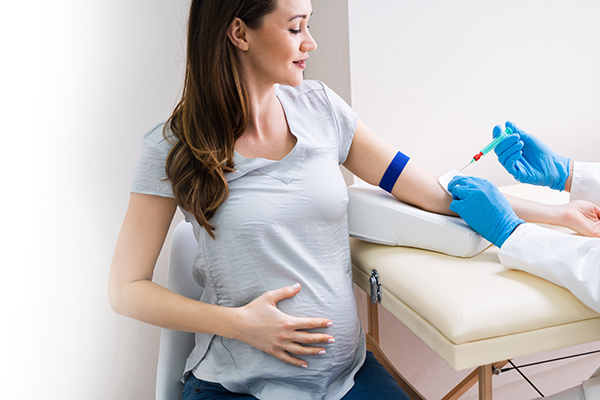According to the current Standard of Perinatal Care, all women are given various blood tests during pregnancy, in addition to ultrasounds. Every pregnant woman should have specific examinations done at particular weeks of pregnancy. This is extremely important in order to detect possible abnormalities or, for example, an ongoing infection in time. What antibodies are tested during pregnancy?
What antibodies are tested in pregnancy?
Mandatory tests during pregnancy include testing antibody levels for rubella and toxoplasmosis. In addition, testing for antibodies related to the risk of serological conflict is also mandatory.
Many women also choose, along with their health care provider, to test for antibodies related to cytomegalovirus. It is a screening test and recommended, but not mandatory in Poland in the course of pregnancy.
Antibody testing in pregnancy-when?
All examinations during pregnancy should take place in accordance with the regulation of the Ministry of Health. At the first visit during pregnancy, the gynecologist usually orders a test of the level of immune antibodies to red blood cell antigens. This is an extremely important test to assess the risk of serological conflict. In addition to this, IgG and IgM antibodies for toxoplasmosis and rubella are also tested at that time.
The optional cytomegalovirus antibody test is also performed as early as the first trimester and, based on the result, further tests are decided.
Between 21. and 26th week of pregnancy, however, the level of anti-D antibodies in Rh-negative women is tested. This test is then repeated between 27. a 32. week.
If the mother-to-be had a negative result for toxoplasmosis in the first test at the beginning of pregnancy, the IgM class antibody test should be repeated between 21. a 26. week.
Antibody testing in pregnancy-results
Antibody testing for infectious diseases such as rubella or cytomegalovirus involves testing antibodies in the IgG and IgM classes. The presence of the former (IgG positive) indicates past contact with the virus. This is equivalent to being immune to further infections that could occur during pregnancy and cause possible complications. A positive IgM class antibody result, on the other hand, suggests an ongoing infection or one that occurred relatively recently. In the case of cytomegalovirus, for example, they are believed to remain in the blood for up to nine months after infection. In the situation of a positive result, a test is also carried out, the so-called “test”. IgG avidity (i.e., “strength of attachment” to the viral particle). If the avidity is low, this suggests current or recent infection. When, on the other hand, the avidity is high-it indicates a long-standing infection that carries no risk to the pregnancy and the developing baby.
Antibody testing in pregnancy- serological conflict
Antibody testing during pregnancy is extremely important because of the risk of serological conflict that can occur between mother and child. The woman then produces anti-D antibodies directed against the baby’s blood cells, which can lead to the development of hemolytic disease. Further consequences of untreated serological conflict are hypoxia, organ damage, generalized edema, and eventually intrauterine death of the baby.
For this reason, at her first pregnancy appointment, every pregnant woman is ordered an indirect antiglobulin test to determine the presence of immune antibodies in her blood. If a woman is Rh-negative and does not have anti-D antibodies, the test is repeated in subsequent trimesters to control for immunization, i.e. antibody formation.
Read also:
Blood type inheritance-what blood type will the child have?
Rate this article:











